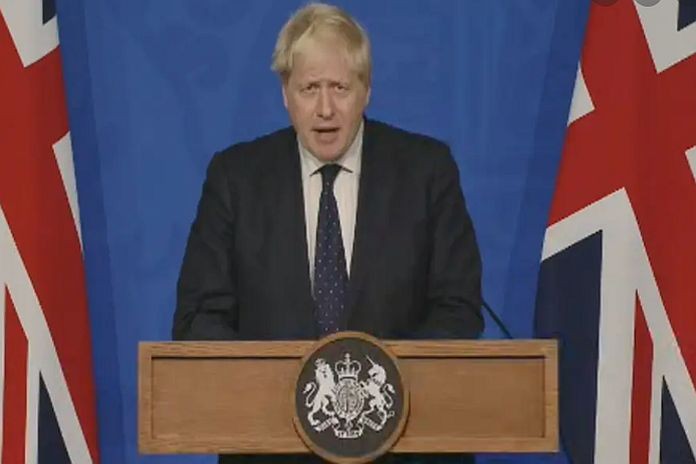By Caribbean News Global ![]()
LONDON, England – The UK government on Wednesday announced that England will fully return to Plan A on Thursday January 27, thanks to the success of the booster programme, with ministers urging anyone who has still not had a top-up jab to come forward and Get Boosted Now. On December 8, prime minister Boris Johnson announced a move to Plan B following the rapid spread of the Omicron variant.
“The measures introduced helped to control the spread of COVID-19, bought time to assess the variant and allowed The National Health Service (NHS) to rapidly expand the booster programme to strengthen defences. While vaccinations remain a priority, the success of the vaccination programme so far means we are now able to cautiously return to Plan A in England,” said the Department of Health and Social Care.
This means from now, Wednesday, January 19:
- The government is no longer asking people to work from home if they can. People should speak to their employers about arrangements for returning to the office, and should follow the Working Safely guidance.
From Thursday, January 20:
- Face coverings will no longer be advised in classrooms for both staff and pupils.
From Thursday, January 27:
- Venues and events will no longer be required by law to use the NHS Covid Pass. The NHS Covid Pass can still be used on a voluntary basis as was previously the case in Plan A.
- Face coverings are no longer required by law in any setting. Public health guidance will remain in place, suggesting individuals should continue to wear a face-covering in crowded and enclosed spaces, where you may come into contact with people you do not normally meet.
- The Department for Education will remove national guidance on the use of face coverings in communal areas, with local directors of public health able to recommend the use of face coverings in education settings across their area only where the department and public health experts judge the measure to be proportionate due to specific health concerns. This is a temporary measure and directors of public health continue to advise individual settings experiencing outbreaks.
- Any local introduction of face coverings must be subject to routine review and removed at the earliest opportunity.
Throughout the pandemic, the government has maintained a balanced approach to COVID-19 measures, considering the freedoms of individuals together with the public health concerns of COVID-19. Although the government is able to remove blanket restrictions, prevalence of COVID-19 is still high with over 16,000 people in hospital in England with the infection. As such individuals, employers and local leaders are urged to act cautiously and consider the risk of COVID-19 when moving back to Plan A. The guidance on gov.uk will be updated accordingly, reads the government communication.
“Due to the success of the booster programme, with over 30.5 million boosters given in England, the situation continues to improve. The latest data from the UK Health Security Agency (UKHSA) shows that getting a booster is 89 percent effective in preventing hospitalisation from COVID-19 from two weeks after it is administered and is 65 to 75 percent effective against symptomatic infection from Omicron. Vaccinations remain our best defence against COVID-19 and in December the prime minister launched a national appeal to Get Boosted Now.
“The government met its target of offering every eligible adult a booster jab by Christmas and now more than 4 in 5 (81%) of eligible adults in England have had their booster. Over 90 percent of people aged 12 and above have had their first dose and over 83 percent have had their second. The government recently provided an extra £22.5 million to councils for community vaccine champions to help drive uptake in harder-to-reach communities.”
Health and social care secretary Sajid Javid, said:
“Today marks the start of the next chapter in this country’s fight against COVID-19. Our plan was to use the time that Plan B gave us to give ourselves extra power in our fight against Omicron. That plan has worked, and the data shows that Omicron is in retreat. But it’s not the end of the road and we shouldn’t see this as the finish line. The best step that we can all take is to get vaccinated. It was the jabs that have got us this far, and the jabs can keep us here too”.
The vaccine programme is being bolstered by the development of world-leading antiviral treatments. In December, the prime minister confirmed a new national panoramic study where 10,000 UK patients at risk of serious illness from COVID-19 will be given molnupiravir to treat their symptoms at home. Testing also remains a vital tool in controlling the spread of COVID-19 and has allowed the government to take a proportionate approach to restoring individual freedoms.
“Thanks to the accessibility of lateral flow tests (LFT), people self-isolating with COVID-19 can now end their isolation after five full days, provided they test negative on day 5 and 6. Contacts who are fully vaccinated can also avoid isolation by testing daily with LFTs and most of those who test positive on a LFT no longer have to confirm their case with a PCR test,” the Department of Health and Social Care said in a press release.





